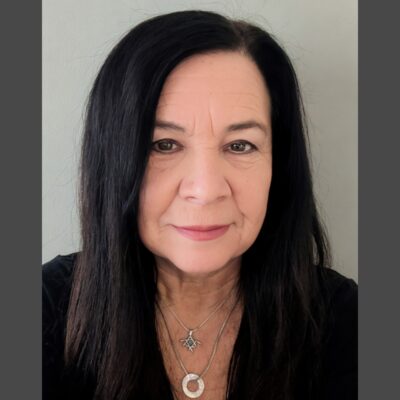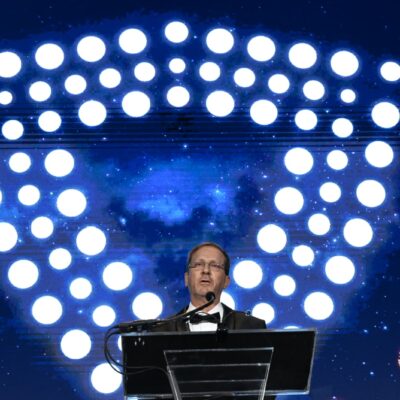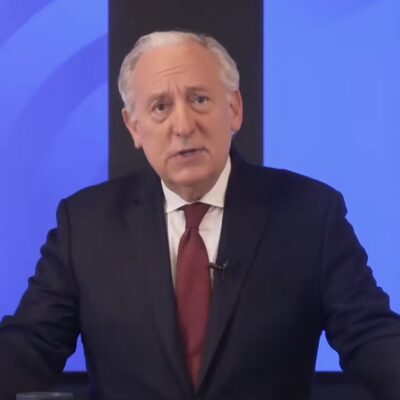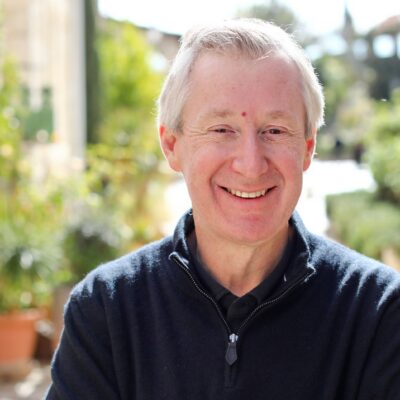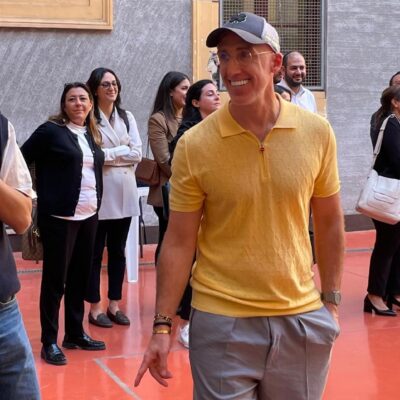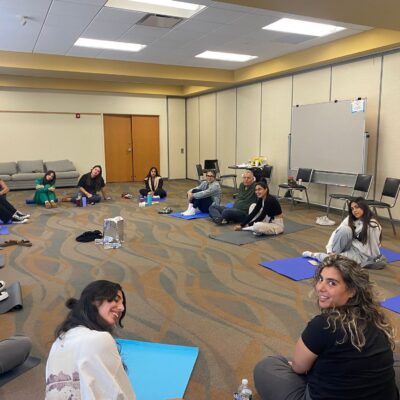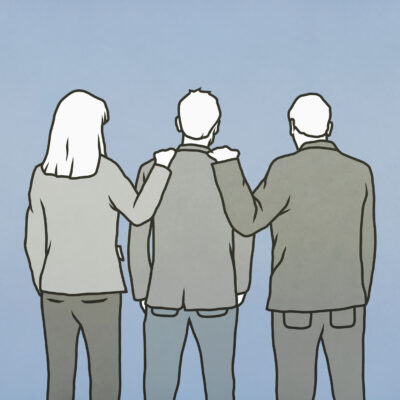CITY ON A HILL
Bill Ackman gets warm welcome, honorary degree from University of Haifa, says he’s ‘bullish’ on Israel
Israeli institution honors Ackman and his wife, Neri Oxman, after donation in memory of her mother; the investor tells eJP he's looking to get involved philanthropically in Israeli education
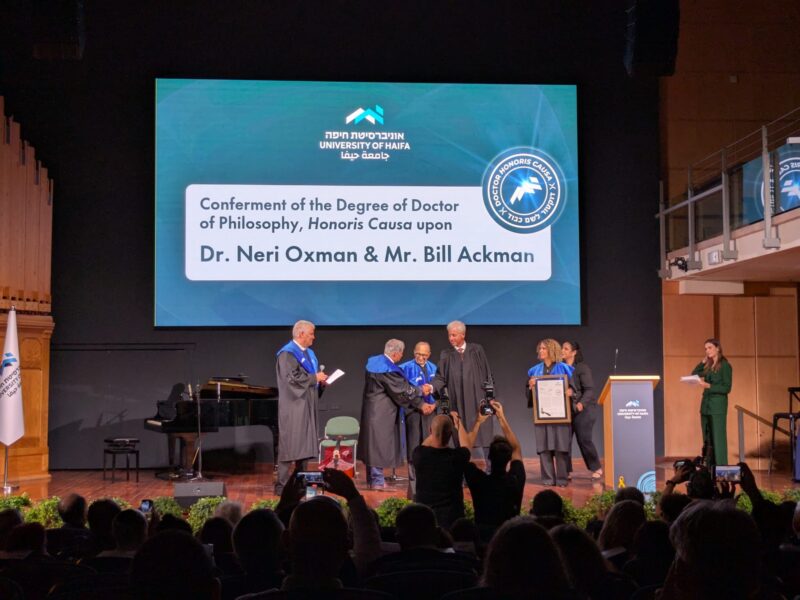
Judah Ari Gross/eJewishPhilanthropy
Investor Bill Ackman (center) receives honorary doctorate from the University of Haifa on Sept. 14, 2025.
Pershing Square Holding’s Bill Ackman declared himself “very bullish” on Israel on Sunday after spending roughly a week in the country in what he described as his first business trip, which included meetings with top Israeli business and political leaders, opening the Tel Aviv Stock Exchange, which he owns a nearly 5% stake in, and participation in the Jefferies TechTrek conference in Tel Aviv.
“I met many important members of the business community, many heads of banks, insurance companies, institutions, and then many venture capitalists… And I had the opportunity to meet with the leadership of the country,” Ackman said during a “master class” held at the University of Haifa on Monday morning before receiving an honorary doctorate from the institution that evening. “It leaves me with enormous confidence in the future of this country.”
Ackman, who has long maintained ties to the Jewish community — including a stint as chair of the Jerusalem Foundation — has deepened his connections to Israel in recent years after marrying Neri Oxman, a Haifa-born multidisciplinary material scientist and technologist, who also received an honorary doctorate from the university.
The degrees were awarded following an undisclosed donation to the university by the couple, which will — among other things — go toward the construction of a student plaza that will be named for Oxman’s mother, architect Rivka Oxman, who died in March, and that will be designed by famed Israeli architect — and close family friend — Moshe Safdie. In her speech at the awards ceremony, Oxman thanked the university for providing a way to honor her mother’s legacy “in one of my mother’s best loved places, on Mount Carmel, under the pines, overlooking the boundless sea.”
On Sunday morning, both Oxman and Ackman delivered “master class” lectures — hers on material ecology and computational design and his on leading with purpose in a changing world — and in the evening the university held its degree conferment ceremony, with a reception and an intimate, elegant dinner on the 30th floor of the university’s main tower, featuring slow-roasted beef, seared duck breast, fried fish and local Israeli wines. The gathering was attended by the institution’s professional and lay leaders, as well as faculty and some of its top supporters and prominent Israeli philanthropists, including former fighter pilot and businessman Eytan Stibbe; American-Israeli philanthropist Shira Ruderman; social entrepreneur Ronny Douek, who presented Oxman with her honorary degree alongside Safdie; and businessmen and philanthropists Sami Sagol and Doron Livnat, both of whom presented Ackman with his degree.
At the ceremony, University of Haifa President Gur Alroey, a historian focused on migration and early Zionism, stressed the importance of a strong relationship between Israel and the Diaspora.
“I often tell my students that the State of Israel is a joint venture between those who made aliyah and settled here, and the Jews of the Diaspora, particularly American Jewry. This is a formula that has proven itself time and again,” he said. “We must continue to nurture and strengthen it. Your partnership, Bill, as an American Jew, together with Neri, an Israeli from Haifa, embodies the unique and symbolic bond between the two largest Jewish communities in the world. Through your work for the benefit of Israel and Israel’s society, you strengthen Israel’s security, and for that, we offer our deepest gratitude.”
In his master class, Ackman described the progression of his philanthropic beliefs, from initially striving to make “a pile of money” in order to “allocate it in the way that I thought made the most sense and do a lot of good” to his current trust in capitalism and markets to do the most good for the world, with philanthropy filling in the remaining gaps.
“I’ve always been a believer that — and I’ve learned this from being philanthropic — that capitalism actually is a better way to solve problems than philanthropy. Philanthropy should be left for those problems that capitalism hasn’t yet figured out how to solve, and technology actually enables capitalism to solve more problems than it could have previously,” he said.
Ackman said this belief drove his decision last January to personally purchase his 4.99% stake in the Tel Aviv Stock Exchange. (He explained that his hedge fund Pershing Square could not easily invest in public securities due to regulatory constraints, which is why he and Oxman did so privately.)
“It was sort of a bet on the future of the country. That investment is up fivefold from January 2024, and I didn’t really make it principally to make money, but I would say it’s a very good and leading indicator of the country,” he said, adding that he was “very bullish” on both America and Israel.
Speaking to the Israeli financial newspaper Globes last week, Ackman said that he intended to invest $1 billion in the Israeli economy.
“Why am I excited about Israel? I think Israel has the highest ratio of IQ and IP [intellectual property] to population,” he said. Ackman added that he believes that the past two years of war will strengthen the emerging generation of Israeli adults, comparing them to the so-called “greatest generation” that emerged from World War II.
Asked if he was concerned by reports of an emerging “brain drain” in Israel, with more educated people considering emigration because of the security situation and the country’s politics, Ackman said that he had questioned Israeli business leaders about the issue. “They said there are more people coming here than people leaving,” he said. “It’s anecdotal, but that’s their view.” (Recent Israeli demographic data in fact shows greater emigration than immigration.)
Ackman said that he was more concerned about the risks posed by Israeli regulations limiting banker salaries. “The best people are going to leave banks and go to the private sector,” he said.
Speaking to eJewishPhilanthropy after receiving his honorary degree, Ackman said that during his trip, he had identified areas in Israel for his philanthropic foundation to play a role, particularly education and science.
“We’re very interested in education. We had some interesting meetings with a number of people and institutions,” Ackman told eJP.
Asked if that included education in Israel’s Haredi community, which typically eschews secular studies in favor of purely religious education — an area of deep concern for the Israeli economy — Ackman said that was part of it.
“AI is going to help with that,” said Ackman, whose fund has invested heavily in AI-related stocks. He noted that his and Oxman’s daughter was starting to attend Alpha School, an emerging chain of private schools whose day includes two hours of study with an artificial intelligence tutor, followed by four hours of leadership and life skills instruction.
“What’s beautiful about AI is that you can learn 10 times as fast as you can in the classroom, which frees them up for religious education as well. We’re sending our daughter to Alpha Schools. There, they do project-based learning in the afternoon, but you could do religious education in the afternoon too. That might be a nice compromise,” he said.
In his master class lecture, Ackman also advocated the adoption of these AI-powered schools in the United States over traditional public schools. “If you look at a city like New York City, we’re spending $42,000 per child, and we’re delivering a horrible education. Kids can’t read in sixth grade. The beauty of software is the marginal cost of software is zero. So I think economic forces are going to push schools to introduce dedicated AI tutors, and I think it’s going to be transformational for education.”
Ackman, who emerged as one of the most forceful and outspoken critics of antisemitism on college campuses and the culture that allowed it to proliferate in the wake of the Oct. 7 terror attacks, received a warm welcome from the university, including from many of its faculty.
He joked that if he had been asked a year and a half ago if he expected to be offered an honorary degree from an institution of higher learning after his no-holds-barred criticisms of American academia, “let alone accepting one, I would have had to say the likelihood would be very close to zero.”
Earlier in the day, during his lecture, he had told the audience that he had only recently started thinking about the issue because of his father, having grown up in an area of New York where overt antisemitism was rare. “At our foundation board meetings, which are held every quarter, my father at the end of one meeting said, ‘Bill, you and Neri, you know, are again not doing anything with respect to antisemitism.’ I said, ‘What antisemitism? The Jews are doing great, Israel’s doing great. There are a lot of other causes and issues that need our resources,” he said.
“When my dad died, on May 31, 2022, … he wrote a few letters of the kind of [funeral preparations,] financial stuff, [one to my] mom. But the third letter was, ‘Bill, I’m really concerned about antisemitism, and we need to do something about it. Those were his last words, right?” he said.
Asked by eJP how he and his foundation would be getting involved in the field of combating antisemitism — one that is notoriously full of a large number of organizations, which don’t always cooperate with one another, and lacks clear metrics and results — Ackman said that he was starting a new fund, the Carob Trust, to take on the issue, but that it was still early days. (The name, he said, comes from the Talmudic story of a man planting a carob tree to provide fruit not for himself but for his descendants.)
Asked about the Trump administration’s tactics with American universities regarding antisemitism during his during his master class — such as the freezing of research grants — Ackman said that he understood the discomfort with the president’s “negotiating style” but that he supported the agreements that are coming out of them.
“I think the deals that have been signed by universities I think are good for America, good for education. Universities are not giving up academic freedom,” he said. “These are deals that every university should be proud to sign. ‘We’re going to create an environment which is discrimination free. We’re going to enforce our rules. We’re going to encourage viewpoint diversity.’ I think every university in the country should adopt a framework like this, not because of pressure from the Trump administration, but because that’s one of the biggest problems we’ve had.”
In his speech after receiving the degree, Ackman noted that he had been thanked on this trip to Israel more than he had at any other time in his life. “I have been active on [social media]. I have worked hard on behalf of our people, on behalf of Israel. But I haven’t taken the risks that a soldier takes when they walk into a war, into Gaza,” he said. “I want you to know that Neri and I — really, Americans generally, with a few bad exceptions — are incredibly appreciative of Israel, defending democracy, defending our values. And we’re eternally grateful. So thank you so much,” Ackman said, ending his speech with a call for the return of the hostages in Gaza, end of the war and dismantling of Hamas — to a standing ovation.

 Add EJP on Google
Add EJP on Google
